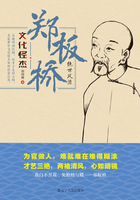And she in her turn stopped short, as a woman does who feels herself carried away by the torrent of her confessions; struck, too, by Lisbeth's eager attention, she thought well to make sure of Lisbeth before revealing her last secrets.
"You see, dear child, how entire is my confidence in you!" she presently added, to which Lisbeth replied by a most comforting nod.
An oath may be taken by a look and a nod more solemnly than in a court of justice.
"I keep up every appearance of respectability," Valerie went on, laying her hand on Lisbeth's as if to accept her pledge. "I am a married woman, and my own mistress, to such a degree, that in the morning, when Marneffe sets out for the office, if he takes it into his head to say good-bye and finds my door locked, he goes off without a word. He cares less for his boy than I care for one of the marble children that play at the feet of one of the river-gods in the Tuileries. If I do not come home to dinner, he dines quite contentedly with the maid, for the maid is devoted to monsieur; and he goes out every evening after dinner, and does not come in till twelve or one o'clock. Unfortunately, for a year past, I have had no ladies' maid, which is as much as to say that I am a widow!
"I have had one passion, once have been happy--a rich Brazilian--who went away a year ago--my only lapse!--He went away to sell his estates, to realize his land, and come back to live in France. What will he find left of his Valerie? A dunghill. Well! it is his fault and not mine; why does he delay coming so long? Perhaps he has been wrecked--like my virtue."
"Good-bye, my dear," said Lisbeth abruptly; "we are friends for ever.
I love you, I esteem you, I am wholly yours! My cousin is tormenting me to go and live in the house you are moving to, in the Rue Vanneau; but I would not go, for I saw at once the reasons for this fresh piece of kindness----"
"Yes; you would have kept an eye on me, I know!" said Madame Marneffe.
"That was, no doubt, the motive of his generosity," replied Lisbeth.
"In Paris, most beneficence is a speculation, as most acts of ingratitude are revenge! To a poor relation you behave as you do to rats to whom you offer a bit of bacon. Now, I will accept the Baron's offer, for this house has grown intolerable to me. You and I have wit enough to hold our tongues about everything that would damage us, and tell all that needs telling. So, no blabbing--and we are friends."
"Through thick and thin!" cried Madame Marneffe, delighted to have a sheep-dog, a confidante, a sort of respectable aunt. "Listen to me; the Baron is doing a great deal in the Rue Vanneau----"
"I believe you!" interrupted Lisbeth. "He has spent thirty thousand francs! Where he got the money, I am sure I don't know, for Josepha the singer bled him dry.--Oh! you are in luck," she went on. "The Baron would steal for a woman who held his heart in two little white satin hands like yours!"
"Well, then," said Madame Marneffe, with the liberality of such creatures, which is mere recklessness, "look here, my dear child; take away from here everything that may serve your turn in your new quarters--that chest of drawers, that wardrobe and mirror, the carpet, the curtains----"
Lisbeth's eyes dilated with excessive joy; she was incredulous of such a gift.
"You are doing more for me in a breath than my rich relations have done in thirty years!" she exclaimed. "They have never even asked themselves whether I had any furniture at all. On his first visit, a few weeks ago, the Baron made a rich man's face on seeing how poor I was.--Thank you, my dear; and I will give you your money's worth, you will see how by and by."
Valerie went out on the landing with /her/ Cousin Betty, and the two women embraced.
"Pouh! How she stinks of hard work!" said the pretty little woman to herself when she was alone. "I shall not embrace you often, my dear cousin! At the same time, I must look sharp. She must be skilfully managed, for she can be of use, and help me to make my fortune."
Like the true Creole of Paris, Madame Marneffe abhorred trouble; she had the calm indifference of a cat, which never jumps or runs but when urged by necessity. To her, life must be all pleasure; and the pleasure without difficulties. She loved flowers, provided they were brought to her. She could not imagine going to the play but to a good box, at her own command, and in a carriage to take her there. Valerie inherited these courtesan tastes from her mother, on whom General Montcornet had lavished luxury when he was in Paris, and who for twenty years had seen all the world at her feet; who had been wasteful and prodigal, squandering her all in the luxurious living of which the programme has been lost since the fall of Napoleon.
The grandees of the Empire were a match in their follies for the great nobles of the last century. Under the Restoration the nobility cannot forget that it has been beaten and robbed, and so, with two or three exceptions, it has become thrifty, prudent, and stay-at-home, in short, bourgeois and penurious. Since then, 1830 has crowned the work of 1793. In France, henceforth, there will be great names, but no great houses, unless there should be political changes which we can hardly foresee. Everything takes the stamp of individuality. The wisest invest in annuities. Family pride is destroyed.
The bitter pressure of poverty which had stung Valerie to the quick on the day when, to use Marneffe's expression, she had "caught on" with Hulot, had brought the young woman to the conclusion that she would make a fortune by means of her good looks. So, for some days, she had been feeling the need of having a friend about her to take the place of a mother--a devoted friend, to whom such things may be told as must be hidden from a waiting-maid, and who could act, come and go, and think for her, a beast of burden resigned to an unequal share of life.
Now, she, quite as keenly as Lisbeth, had understood the Baron's motives for fostering the intimacy between his cousin and herself.














